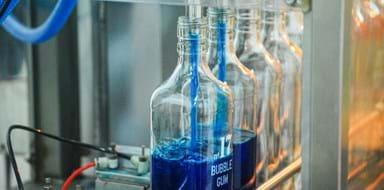
A software startup has developed an AI-driven data analytics solution with game-changing potential to transform supply-chain efficiency in the fast-moving consumer goods (FMCG) sector.
Singular Intelligence (SI) partnered with supermarket giant Sainsbury’s and food producer Cranswick as part of the Made Smarter Innovation Digital Supply Chain Hub (DSCH) programme which is working to advance and accelerate the understanding and inclusion of digital technology in UK supply chains.
The project developed and tested an AI solution to interpret market signals to mitigate the risk of supply-demand imbalances on the retailer’s Taste the Difference Range of pork products.
The outcomes were extraordinary, cutting Sainsbury’s food waste by up to 70% on some products, while increasing availability by up to 5%. Meanwhile, Cranswick reduced its oversupply of pork sent to the retailer by over 15%.
This proof of concept is now being considered by Cranswick as part of its digitalisation programme. SI has grown its supply chain team and the business is now working with other FMCG players.
Jermey Silver, CEO of Digital Catapult, which is leading the DSCH programme, said: “This fascinating innovation project has brought together two big players in the UK’s food supply chain and an exciting start-up to demonstrate the extraordinary insights that applying advanced technologies like AI to existing data can have.”
Sherrie Rad, Innovation Lead for Made Smarter Innovation, said: “The Made Smarter Innovation funded Digital Supply Chain Hub is enabling the development of solutions using real supply chain data from UK companies.
“This project clearly demonstrates what collaboration can achieve to solve some of industry’s major challenges around sustainability, resilience and efficiency.”
The Inspiration
Cranswick, headquartered in Hull, produces a variety of pork products for the UK, European, US and South East Asian markets, including Sainsbury's Taste the Difference range.
As a key member of the UK meat industry, the business has been impacted by reduced demand, caused by high inflation, global conflict and economic uncertainty, as well as labour shortages at farms and factories.
These planning challenges have resulted in revenue losses and food waste for Sainsbury’s and a glut in the supply of pigs for Cranswick.
Clive Stephens, Head of Research & Development, Cranswick, said: "Our ambition is to be the world’s most sustainable meat producer balancing sustainability and profitability. This means optimising control and security of the supply chain, from farm to fork.
"We embrace robust systems, brilliant data and analysts, and a culture of continuous improvement to optimise our processes.
"This project gave us the opportunity to examine our supply chain, analyse downstream and upstream transparency, and explore how AI can bring into play external parameters, create clarity, much earlier, to support planning decision-making.”
The Innovation
SI, based in London, was launched in 2017 and has been developing its flagship forecasting solution CatmanAI which applies data to its algorithm to automate and augment the decision-making process.
Having already tested the software successfully with Unilever with a project focussed on consumer preferences, SI was confident it could develop a product for the supply chain.
Using research, interviews, factory visits and meetings with supply chain teams, SI was able to understand the complexity of the pork supply chain and how decisions were made.
Data from both Cranswick and Sainsbury’s was fed into the solution which had three functions. Demand-sensing technology was used to track and forecast demand signals such as sales, product availability and the weather. Supply-sensing technology analysed cost and production risk, and supply shock to anticipate supply demand imbalance. The final function was to propose planning actions to fix the gap.
The Impact
For Sainsbury’s there was an improvement in product availability of between 2-5% and a reduction of food waste of between 50-70%.
Cranswick also recorded improved figures. It estimated that the oversupply of pork sent to the retailer fell by 15.25%.
Clive explained: “SI’s platform demonstrated our process could be improved. We used the insights to improve our efficiency and understand where we can reduce waste and increase sales.
“There has been a lot of excitement from these initial results. This project has clearly demonstrated the benefits of applying AI. Our work now is to explore how transformational technologies like AI can fit in with our digital roadmap.”
The positive outcomes have also encouraged SI to invest in its supply chain AI, expanding its team from three to eight to explore opportunities with leading global players in the FMCG sector, as well as other industries.
Sarvesh Kumar, CEO, Singular Intelligence, said: “It's been a very encouraging experience. The partners were very supportive in terms of provision of data and that gave us some real insights, with some fantastic impacts for both.”
From an industry perspective, the pilot has demonstrated the power and potential of collaboration within the supply chain.
“If you extrapolate what has been achieved between these two partners outwards to the industry, the potential is extraordinary,” Sarvest added. “However, industry needs to overcome long-standing challenges of collaboration and data transparency to realise these opportunities.
“Innovation doesn't exist in isolation. It needs an ecosystem to flourish, one that brings together technology companies like us, customers in need of solutions to their pain points, and investors to bring the partners together. I am confident that projects like this from the Digital Supply Chain Hub will help break down existing silos and drive impactful change.”





